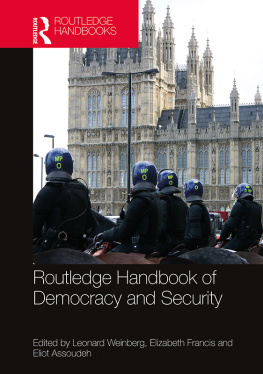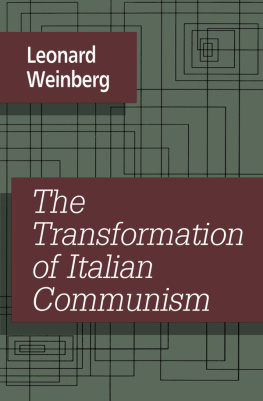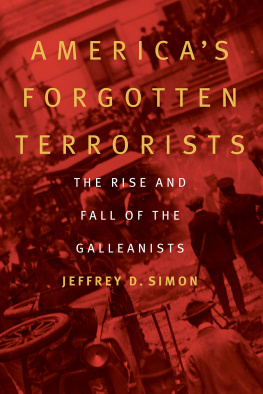THE RISE AND FALL OF ITALIAN TERRORISM
New Directions in Comparative and International Politics
Series Editors
Peter Merkl and Haruhiro Fukui
No Farewell to Arms ? Military Disengagement from Politics in Africa and Latin America, Claude E. Welch, Jr.
Comparing New Democracies: Transition and Consolidation in Mediterranean Europe and the Southern Cone, edited by Enrique A. Baloyra
Comparing Pluralist Democracies: Strains on Legitimacy, edited by Mattei Dogan
The Rise and Fall of Italian Terrorism, Leonard Weinberg and William Lee Eubank
About the Book and Authors
a
Between the late 1960s and the early 1980s Italy suffered one of the most severe waves of domestic political terrorism experienced by any Western democracy. During those years, Italian terrorists committed more than 12,000 acts of political violence. The 1978 assassination of former prime minister Aldo Moro and the 1980 bombing of the railroad station in Bologna, in particular, attracted world-wide publicity. Aside from its magnitude, Italian terrorism has been distinguished from that in other Western democracies by the fact that very little violence can be traced to the grievances of ethnic or religious minorities and by the prominent role of right-wing bands.
This book relates the formation, development, and eventual defeat of both neo-Fascist and left-wing terrorist groups in Italy. In addition to assessing the historical origins and contemporary manifestations of Italian terrorism, the authors examine the biographies of 2,500 individuals who participated in the violence, answering such questions as who the terrorists were, where they came from, and what led them to commit violent acts. The authors explore the causes of violence not only by reviewing terrorist groups' ideological pronouncements but also by analyzing the social, economic, and political conditions in those sections of Italy hardest hit by terrorism. Finally, the book describes the actions taken by the much-maligned Italian state to overcome successfully the terrorist threat.
Leonard Weinberg is professor of political science at the University of Nevada, Reno. William Lee Eubank is assistant professor of political science, also at the University of Nevada, Reno.
The Rise and Fall of Italian Terrorism
Leonard Weinberg and William Lee Eubank
Eubank would like to dedicate his portion of this effort to his friends CM, CP, JMF, K2 and Katrina
First published 1987 by Westview Press
Published 2019 by Routledge
52 Vanderbilt Avenue, New York, NY 10017
2 Park Square, Milton Park, Abingdon, Oxon OX14 4RN
Routledge is an imprint of the Taylor & Francis Group, an informa business
Copyright 1987 by Taylor & Francis
All rights reserved. No part of this book may be reprinted or reproduced or utilised in any form or by any electronic, mechanical, or other means, now known or hereafter invented, including photocopying and recording, or in any information storage or retrieval system, without permission in writing from the publishers.
Notice:
Product or corporate names may be trademarks or registered trademarks, and are used only for identification and explanation without intent to infringe.
Library of Congress Cataloging-in-Publication Data
Weinberg, Leonard
The rise and fall of Italian terrorism.
(New directions in comparative and international
politics)
Bibliography: p.
Includes index.
1. TerrorismItalyHistory20th century.
2. ItalyPolitics and government20th century.
I. Eubank, William Lee. II. Title. III. Series.
HV6431.W44 1987 303.6'25'0945 87-14725
ISBN 13: 978-0-367-29556-1 (hbk)
Much of the research on which this book is based was done in 1984 while I was a Fulbright Fellow at the University of Florence. The time spent in Italy offered me an opportunity not only to review the substantial body of writing about terrorism produced by both its observers and practitioners but also to obtain access to sentence and other court documents concerning the operations of the major right- and left-wing terrorist groups. I also was able to interview police investigators, state prosecutors and judges in Florence, Turin, Milan and Romeindividuals who had first-hand experiences in the effort to repress terrorist activities. In many cases the sites of these encounterscriminal court buildings and regional police headquarters told their own stories of public institutions under seige. The presence of heavily armed guards, metal detectors, closed-circuit television cameras and bullet-proof glass all testified to the atmosphere in which those who fought against the terrorists had done their work.
Among the large number of people in Italy who provided indispensable help in the completion of this project, some should be mentioned here. Those from the Italian system of justice were Patruno Nicola, Marcello De Roberto, Pier Luigi Vigna (Florence), Maurizio Laudi (Turin), Ferdinando Pomarici (Milan), Antonio Bacchiati (Rome). Scholars who offered their time and assistance were: Leonardo Morlino, Luigi Catnazaro, Luigi Bonante, Donatella della Porta, Franco Ferraresi and Gianfranco Pasquino. Among the American Embassy and consular officials, Frederic Vreeland (Rome), John Shippe (Florence) and Massimo De Leonardis (Milan) were particularly helpful. Cipriana Scelba, Luigi Filadoro and Maria Amata Basso of the Fulbright Commission deserve high praise. Special credit is due Sally Cantini, a teacher at the American School in Florence, for keeping my energetic son busy enough to allow his father to complete the work.
At the University of Nevada, Reno, Alison Trigero transposed the first version of the manuscript into a readable typescript. Don W. Driggs, Chair of the Department of Political Science and Sandra K. Neese, Director, Center for Applied Research, both provided critical last-minute institutional support to complete the final version of the book. Jackie Sharp, in our department, and G. Francis Smith, at the Center, both worked long hours in actually preparing this final version, and their extra effort at a critical time is much appreciated. Susan McEachern, Editor at Westview, should also be singled out for making this a pleasant experience and for her support. I would also like to thank my colleagues who put up with my, and Eubank's, work habits; their patience with idiosyncratic behavior is gratefully acknowledged.
Finally, and most importantly, my wife, Sinikka, should be recognized for the tolerance she has displayed in putting up with all of this.
Leonard Weinberg
1
Introduction
Italian democracy may not be as fragile as many of its observers feared or imagined. It has lasted more than twice as long as the Fascist dictatorship that preceded it. But the history of democratic rule in republican Italy is hardly like that of modern Switzerland or the Scandinavian countries. Since the end of the Second World War, Italy's citizens and their political leaders have had to overcome massive problems of both state and society that their counterparts in more tranquil parts of Europe have not encountered.
The particular problem to which this book is devoted is that of political terrorism. As a domestic problem, as opposed to an outgrowth of various international tensions, the recent experience of terrorism in Italy was among the most virulent and prolonged among the western democracies. The fact that it has largely been overcome should be a source of satisfaction for all those who regard the country and its people with affection. But the fact that it occurred in the first place and was so severe, raises troubling questions about the health of both the society and its democratic order. Our intent is to describe what happened and then seek to determine why thousands of Italians took up arms against their democracy.












